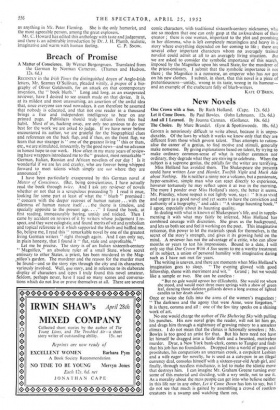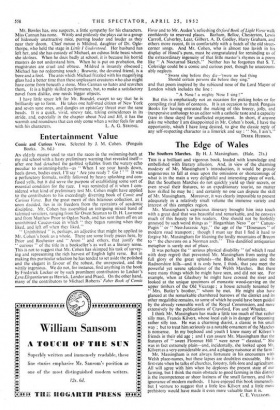New Novels
GENIUS is notoriously difficult to write about, because it is unpre- dictable. Of the laws by which it works we know only that they are different from those which govern talent. Thus attempts to ration- alise the career of a genius, to find motive and stimuli, generally make nonsense. By giving explanations based on talent, by trying to make ordinary common-sense of what is neither common nor ordinary, they degrade what they are striving to celebrate. When the subject is a supreme genius, the pitfalls for the writer are terrifying.
Miss Holland has avoided them. The Shakespeare she presents could have written Lear and Hamlet, Twelfth Night and Much Ado about Nothing. He is neither a ninny nor a volcano, but a passionate, hyper-sensitive, simple man who can react directly to experience, however tortuously he may reflect upon it at two in the morning. The more I ponder over Miss Holland's story, the better it seems. Mr. Priestley, whose respect is not lightly won, says : " It is as vivid and urgent as a good novel and yet seems to have the conviction and authority of a biography," and adds : "A strange haunting book." I agree, especially about its haunting quality.
In dealing with what is known of Shakespeare's life, and in supple- menting it with what may fairly be inferred, Miss Holland has combined courage with discretion. She gives us the background, and lets us both see and feel it working on the poet. This imaginative reticence, this power to let the materials speak for themselves, is the secret of the story's strength, and gives it its growing hold on the mind. A reviewer has not the advantage of a critic, who can allow months or years to test his impressions. Bound to a date, I will only say that One Crown With A Sun seems to me a worthy treatment of its subject, a union of personal humility with imaginative daring such as I have not met for years.
The writing is uneven, and there are moments when Miss Holland's imagination goes to sleep. " The evening glowed with good fellowship, shone with merriment and wit." Grand ; but we would like a sample or. two. She can be careless : "But no gale would uproot her (Elizabeth). She would rot where she stood, and would meet three more springs with a show of green leaf, dancing those skeleton galliards down a long avenue of lighted candles to her death alone."
Once or twice she falls into the arms of the women's magazines : " The darkness and the agony that were Anne, were forgotten." It is there, comma and all : one of the few tiny specks on a shining work of art.
No one would charge the author of The Sheltering Sky with pulling his punches. His new novel grips the reader, will not let him go, and drags him through a nightmare of growing misery to a senseless climax. I do not mean that the climax is fictionally senseless ; Mr. Bowles is too good an artist for that. But his hero need not have let himself be dragged into a futile theft and a besotted, motiveless murder. Dyar, a New York bank-clerk, comes to Tangier and finds that his job has no foundation. Dropped into a world of pimps and prostitutes, his compatriots an uncertain crook, a corpulent Lesbian and a wife eager for novelty, he is used as a cats-paw in an illegal currency deal, consoles himself with a sixteen-year-old Arab girl, and finally, through needless mischance, is led to make the idiotic move that destroys him. I can imagine Mr. Graham' Greene turning over some of this material and deciding, with a wry smile, not to use it. As a morality about the mess people can get into who believe neither in this life nor in any other, Let it Come Down has lots to say, but I do not see that much is gained by assembling a crowd of rootless creatures in a swamp and watching them rot. Mr. Bowles has, one.suspects, a little sympathy for his characters. Miss Cannan has none. Wittily and pitilessly she plays cat to a group of hideously unattractive mice, purring louder and louder as they near their doom. Chief mouse is Mildred, daughter of Dr. Ogle- thorpe, who held the stage in Little I Understood. Her husband has left her, and she has custody of Michael, an odious little beast whom she idolises. When he does badly at school, it is because his horrid masters do not understand him. When he is put on probation, the magistrates are cruel and obtuse. Mildred is insanely obsessed ; Michael has no redeeming touch ; Brownie, the devoted friend, is a bore and a fool. The ants which Michael frizzled with his magnifying glass had a better time than these unpleasant creatures who also might have come from beneath a stone, Miss Cannan so hates and scorches them, It is a highly skilled performance, but, to make a satisfactory novel from dislike, one needs bigger objects.
I have little space left for Mr. Brandel, except to say that he is brilliantly up to form. He takes one half-mad citizen of New York and seven sane ones, and dangles an epistolary threat over the sane heads. It is a quick, vivid, sinewy tale, taking coincidences in its stride, and, especially in the chapter about Ned and Jill, it has the warmth and roundness that can only come when a writer feels for and



































 Previous page
Previous page